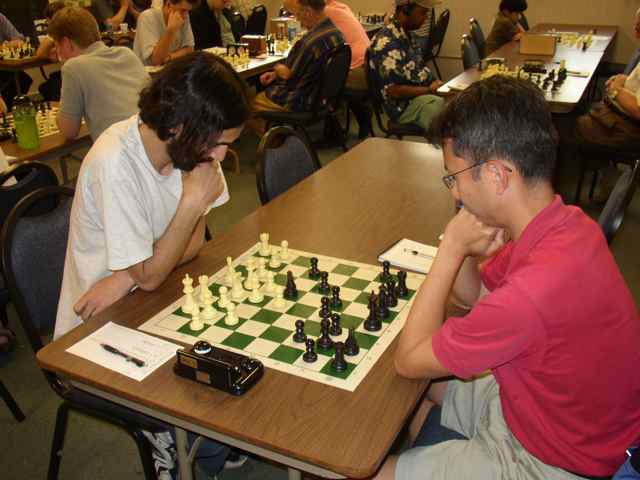Returning to chess, part 2: rejoining the Pittsburgh Chess Club and signing up for my sixth Fred Sorensen Memorial tournament
Aug 29, 2012 · 5 minute read · CommentschessPittsburghJava

Federico Garcia vs. Franklin Chen in 2006
(A chess tournament in 2006.)
So tonight I stopped by the Pittsburgh Chess Club to renew my expired membership and pre-register for the next 6-round Tuesday night tournament, the Fred Sorensen Memorial, which starts on Tuesday after Labor Day. This will be the sixth time I’m playing in this annual tournament.
It’s been almost two years since I played tournament chess.
Here’s a look back at previous years of the tournament and reflections on why I’ve played off and on, and what makes this “comeback” different from all the rest.
Fred Sorensen Memorial tournament in the fall
I first played in this tournament in 2005, as part of my first year back to tournament chess in two decades. I was still trying to regain my skill, and did not play so well. I lost one game, and took second place with a score of 5.0/6.0 points.
By 2006, I was rapidly improving my chess, in the process of making some really radical changes to my knowledge and playing style (given that when I played as a kid, I was basically self-taught and never studied chess in any systematic, thorough way). I won with a perfect score of 6.0/6.0 points.
In 2007, I was still improving, and won with a score of 5.5⁄6.0 points.
In 2008, I had gone several months already playing worse than I had in 2006 and 2007, and I tied for first with a score of 5.0/5.0 points. What happened was that I had first met Abby in late 2006, and started dating in mid-2007. I was not putting any energy into improving or even maintaining my competitive chess sharpness. In retrospect, I should have made some tough decisions about priorities and stopped playing tournament chess by the beginning of 2008. In fact, after playing a couple more months, I quit chess entirely for almost two years: Abby and I got married in 2009.
In 2010, I attempted to make a comeback to chess, but I was not playing well; I was physically and mentally exhausted from other concerns in my life the entire time, even falling asleep during some of my games. I still managed to tie for first with a score of 5.0/5.0 points, but lost rating points doing so. After a couple of months, I quit chess again for almost two years. There was just no room for chess as long as I was focused on completely new priorities including marriage, home, and my 2011 return to music after decades away from it.
Why am I coming back to chess yet again now, in 2012?
This year, I’ve slowly returned to playing a little bit of chess casually, analyzing games, and even writing a bit about chess. And I’m kind of hungering for competition again.
But this time, I have a different attitude and goal than in the past. In the past, when I was in “chess mode”, I was obsessed with things like winning, achievement, improving my rating, maybe attaining an official National Master title (which had slipped past my fingers in 2007: if I had dropped out of one of my tournaments in progress, I would have acquired enough wins to receive the title, but out of sheer pride, I wanted to finish the tournament and ended up on a losing streak).
My goals
Now, my goal is to play well while having fun. I am explicitly not setting a goal of winning games or winning tournaments. I trust that if I play well, I will get whatever I deserve.
In fact, tonight I did something I have never done in my life as a tournament player: I have taken a bye for one of the rounds in the tournament, because of a schedule conflict. Taking the bye means receiving half a point for not playing, and that means decreasing my chances of winning the tournament. Someone not taking a bye could win six games in a row, while my taking a bye means that my maximum possible score if I won five games would be good for at best second place. By taking a bye, I am choosing not to make winning this tournament my highest priority.
In the fourth scheduled round (of six), there is a presentation at the meeting of the Pittsburgh Java Users Group (PittJUG) that I want to attend. In past years, when I was playing Tuesday night chess tournaments most Tuesday, I would miss meetings of PittJUG or other groups that met on Tuesdays. At this point in my life, improving my knowledge as a software developer is more important than winning a chess tournament.
Conclusion
I am returning to tournament chess with a different mindset than I had in previous years. This time, I want to maximize my enjoyment rather than my achievement. We’ll see how this goes. For the record, it seems that I actually always did the best anyway when my goal was enjoyment and I felt relaxed. It was when I put a lot of pressure on myself, as I got better and better, that I repeatedly choked.
(Update of 2015-12-21)
So much for “enjoyment”: three years later, I made a focused push, temporarily putting many things aside in my life, in the fall of 2015 to achieve my US Chess National Master title, and finally made it, a dream come true.
I found an outlet for the enjoyment part of chess, however: teaching private lessons since 2013.